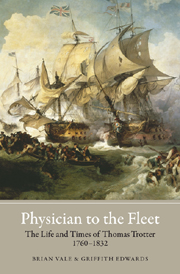Book contents
- Frontmatter
- Contents
- List of Illustrations
- List of Abbreviations
- Foreword
- Preface
- Background
- From Surgeon's Mate to Physician to the Fleet
- The Newcastle Years
- 12 Married Life and Civilian Practice
- 13 An Essay on Drunkenness
- 14 A War of Pamphlets
- 15 A View of the Nervous Temperament
- 16 Physician as Poet and Playwright
- 17 Thomas Trotter and the Great Theatre of Life
- Bibliography
- Index
13 - An Essay on Drunkenness
from The Newcastle Years
Published online by Cambridge University Press: 12 September 2012
- Frontmatter
- Contents
- List of Illustrations
- List of Abbreviations
- Foreword
- Preface
- Background
- From Surgeon's Mate to Physician to the Fleet
- The Newcastle Years
- 12 Married Life and Civilian Practice
- 13 An Essay on Drunkenness
- 14 A War of Pamphlets
- 15 A View of the Nervous Temperament
- 16 Physician as Poet and Playwright
- 17 Thomas Trotter and the Great Theatre of Life
- Bibliography
- Index
Summary
TROTTER'S Essay on Drunkenness, or to give the full title An Essay, Medical, Philosophical and Chemical on Drunkenness and its Effects on the Human Body was published in 1804. Further British editions appeared in 1807, 1810 and 1812. It was published in the United States, and achieved translations into German and Swedish. Copies of the original 1804 edition are today greatly sought after by collectors of rare books. A facsimile edition was published in 1988, with a useful introduction by the medical historian Roy Porter, and is much more accessible. The 1804 volume derived from, and greatly extended, the Latin dissertation which had won Trotter his Edinburgh MD in 1788.
Why, some two hundred years since its original publication, should the Essay be accorded classic status? It was a pioneering text and the first book-length treatise on what is today referred to as ‘alcoholism’ to appear in any language. But beyond that lies the fact that in several ways it is still a thoroughly modern book, which offers thinking of relevance to understanding the patient who is to be seen in tomorrow's clinic, anywhere. It is modern, but it is also a book which is a product of the Enlightenment, with an insistence that drunkenness is to be understood rather than morally denounced. With the vigour and clarity of the language, its acute observations of human behaviour and its compassion, this is a book which also puts us directly in contact with Thomas Trotter the man.
- Type
- Chapter
- Information
- Physician to the FleetThe Life and Times of Thomas Trotter, 1760–1832, pp. 156 - 174Publisher: Boydell & BrewerPrint publication year: 2011



